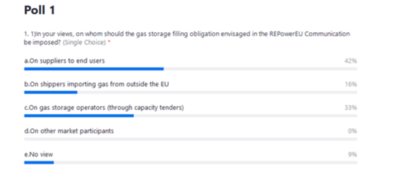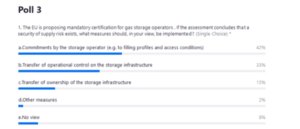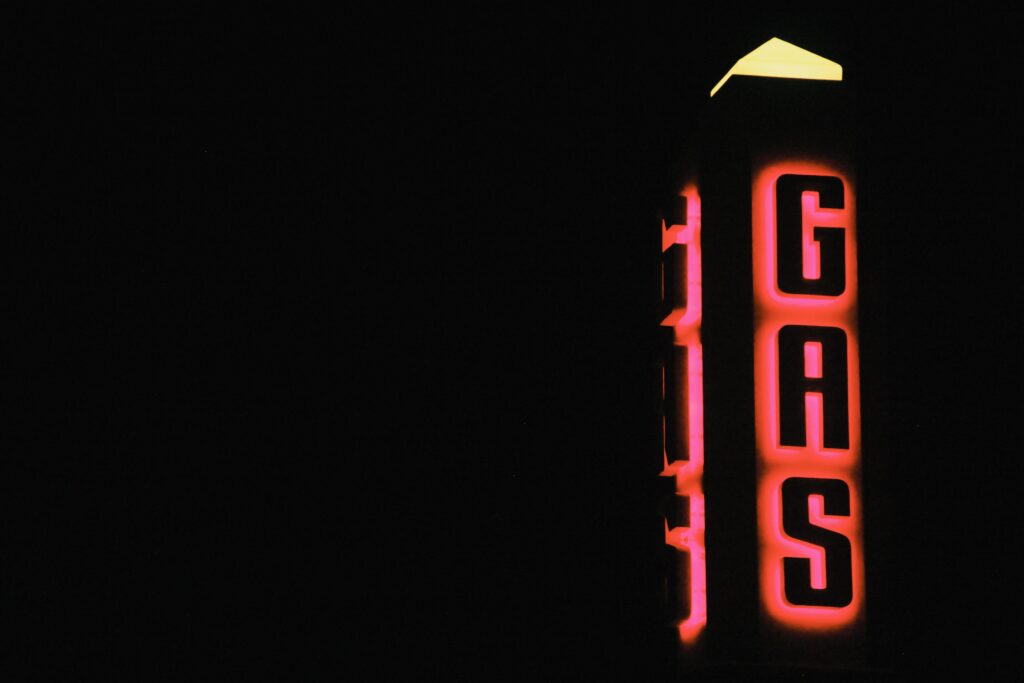Regulating Gas Storage: Enhancing European Security of Supply Through Solidarity?
Highlights from the event: A regulatory framework for gas storage
On Wednesday, 6 April 2022, a #FSRDebate discussed the highly topical issue of gas storage in the European Union. Specifically, speakers debated the legislative proposal put forward by the Commission on 23 March 2022 which aims to strengthen EU energy security ahead of the winter months through new storage obligations. Opening the debate, Leigh Hancher (part-time Professor, FSR) remarked on the unusual, expedited way in which this proposal had been published, that is without public consultation or an impact assessment. Alberto Pototschnig (Executive Deputy Director, FSR) stated that this proposal was indicative of a set of energy policy priorities that had changed significantly since the Russian invasion of Ukraine in February 2022, as well as of a recognition that gas storage could play a major role in reducing the import dependence of Europe. Both co-hosts then welcomed the speakers and participants and gave the floor to Ilaria Conti (Head of Gas, FSR) for the first of the opening presentations.
A Gas Storage Policy for the EU
Ms Conti stated that we are living through a major energy crisis, which started after the summer of 2021 and that we have been looking for solutions to this crisis ever since. The war in Ukraine has exacerbated this situation. Thus, in a very short period of time, we have witnessed a number of initiatives from the EU to deal with this state of affairs. Ms Conti explained that gas storage in the EU covers about a quarter of gas consumption, amounting to approximately 100 bcm. Circa 73% of this storage capacity is located in just five Member States: Germany, Italy, France, the Netherlands and Austria. At the end of autumn 2021, the level of gas storage in the EU was at about 77% of capacity, whereas usually it would be between 80% and 90% at this time of the year. It can further be observed that, in October 2021, those countries with regulated gas storage typically had higher volumes in store. The Commission reacted quickly by publishing a “toolbox” of suggested measures to tackle high energy prices in October 2022, with storage maximisation being one of the proposed tools. The Commission further promised a legislative proposal on storage, as well as the review of the Gas Security of Supply Regulation, in the then-upcoming Hydrogen and Decarbonised Gas Market Package. The proposed amendments to the Security of Supply Regulation introduce (in article 7b) several options that Member States shall consider in case of a risk at regional level being found to exist. These include: an obligation on gas storage users to store minimum underground storage volumes, the possibility of incentives for gas storage bookings via tendering or auctions, an obligation on TSOs to manage strategic stocks, and the integration of storage into the TSO network.
The REPowerEU Communication of 8 March 2022, aiming to phase out Russian gas as soon as possible, promised a legislative proposal by April 2022, including minimum filling obligations, the extension of existing solidarity arrangements (introduced by the Security of Supply Regulation) to storage, the proposal of possible incentives for storage (particularly contracts for difference) and EU coordination of a dedicated storage platform.
On 23 March 2022, then, the Commission published its proposed amendments to the Security of Supply Regulation and the Regulation on Conditions for Access to Natural Gas Transmission Networks. Ms Conti highlighted the most noteworthy parts of the proposal: Articles 6a-d introduce a mandatory filing target of up to 90% by 1 November of every year, reduced exceptionally to 80% for 2022. Member States can choose the instrument and the market participants on which this obligation should be imposed. Since not every Member State has storage capacity, the proposed legislation also calls for the introduction of a burden-sharing mechanism, as well as for the empowerment of the Gas Coordination Group to monitor performance. Article 3 of the proposal introduces mandatory certification of storage system operators, while article 13 introduces a 100% discount on capacity-based transmission tariffs at storage entry-exit points.
The Experience with National Gas Storage Obligations
The second opening presentation was given by Aad Correljé (Associate Professor, TU Delft). Prof. Correljé proposed to take a step back and look where storage fits into the bigger picture of enhancing EU energy security. He stated that, besides storage, factors such as transport and demand also needed to be taken into account. Further, we need to consider the short-term, long-term, and any-term impact of the proposed measures. Prof. Correljé stated that, in the short term, there would be supply problems and considerable differences between Member States and regions. When it comes to the possibility of creating more storage, the presence of suitable geological features (empty gas deposits) plays a crucial role. Further, geographical factors may dictate the feasibility of storage since they may constrain transport infrastructure options. Prof. Correljé cautioned against over-reliance on market mechanism for delivering the levels of gas storage now needed, stating that we have previously seen market failures regarding both capacity and storage levels themselves. He also said that there was a risk of free riding when increasing storage capacity. Prof. Correljé argued that an important element of a successful gas storage regulatory framework would be to stay as close as possible to existing structures in the oil sector. In this context, he mentioned the IEA and EU system of strategic petroleum reserves with specific rules as to the division of tasks and competences. Prof. Correljé concluded his presentation by stating that the market does not work under current circumstances, and that it is thus not the best way of coordination at this point. Rather, greater reliance should be placed on political judgment and the principle of solidarity.
Panel Discussion
Following these opening presentations, Prof. Hancher introduced the expert panel, composed of Catherine Gras (CEO, Storengy DE & UK); Steve Rose (Eurogas); Giuseppina Squicciarini (General Manager Regulatory Affairs Europe & Africa, Shell); and Benoit Esnault (CRE and CEER). She then invited each panellist to comment briefly on the Commission’s proposal and the opening presentations.
In her remarks, Ms Gras stressed that care should be taken not to destroy the market with any new measures. She emphasised that governments alone cannot fill the required 1200 TWh of capacity. She stated that we need to think carefully about the subject, outcome and efficiency of any new obligations, and stressed the need to prevent or compensate for any side effects and to preserve flexibility. Mr Rose agreed with Ms Gras and stated that the market had been very dependable so far and that commercial storage has a strong role to play now and even more so in a decentralised and flexible future. He cautioned that the proposed 1 November filling obligation would be very expensive to fulfil. Mr Rose also argued that it might be imprudent to ‘hardcode’ solutions that may be appropriate now into a regulation which is likely to be in force for a long time. Member States should be given more flexibility to agree on appropriate targets. In the past, we have seen negative effects of storage obligations on competition in other countries.
Ms Squicciarini said that Shell supports the Commission’s intervention to ensure that gas stocks are sufficiently full as Europe heads into the winter. She focused her remarks on two core questions: what level of storage is achievable?; and what measures are needed? Regarding the first question, she stated that the level of storage achievable depends on a host of factors, as was seen in gas storage levels over previous years. Russian gas flows have always been quite essential to achieve a high level of storage, meaning that Europe would now need to quickly procure significant flows from other sources. While LNG can provide some relief, just how much will depend on market dynamics in that sector. Other factors to be taken into account when determining an appropriate storage level are the conditions at the start of the filling seasons, since in the summer there are usually no incentives present. Regarding the second question, Ms Squicciarini stated that the next two months would be critical for any storage targets to be met, and that the right measures need to be put in place. These measures include the creation of incentives, since current prices generally do not incentivise storage. Shell would thus welcome incentives for market participants to fill, rather than penalties or obligations. She also argued in favour of removing price floors where auctions are used as a means to allocate capacity.
In his presentation, Mr Esnault stated that we have seen a deep change in the Commission’s energy storage paradigm. There are two dimensions that make the question of storage challenging. The first of these is the individual dimension, meaning the market value of storage and how the market players would use it. In this context, it is important to think about incentives and how to achieve a convergence between the price of storage and its value for users. The second dimension is the collective or system value of storage. This refers to the fact that the system needs to be coherent as a whole. Achieving this coherence is the main challenge in this dimensions. We are now seeing these two dimensions increasingly becoming an issue at the European level, as opposed to being faced solely at the national level. Given the complexity of the situation, Mr Esnault argued that perhaps it would be more prudent to put non-binding guidelines regarding storage levels in place and to take enough time to carefully design a solution for 2023 and beyond. Concluding, he reiterated his key points that we should be pragmatic in terms of the relationship between countries, that solidarity applies to both volume and financial aspects of storage, and that we should try, as much as possible, to design good rules without destroying the value of storage.
Polls
After the interventions from the panellists, Prof. Hancher put a series of polls to the attendees. In the first of these polls, the audience was asked on whom they think the proposed gas storage filling obligation should be imposed. Many participants (42%) thought that this obligation should fall on suppliers to end users.

In the second poll participants were asked whether, if storage were to become critical infrastructure, storage charges should be subject to regulation akin to gas transmission tariffs. Here, a majority of participants (52%) thought that national regulators should be in charge of setting or approving storage charges, or the methodology used to determine these charges.

In the final poll, the attendees were asked to express their opinion on what measures should be implemented in the proposed mandatory certification regime if a security of supply risk is found to exist. It emerged that 42% of participants thought that additional commitments by the storage operator would suffice to remedy the risk and reinstate certification.

Concluding Remarks
Following a lively exchange on the result of the polls, some concluding thoughts were offered by Oliver Koch (DG Energy, European Commission). Dr Koch remarked on the extraordinary nature of the current legislative proposals and welcomed the interesting debate on the topic at the FSR. He stated that the Commission was generally reluctant to propose market interventions that are not absolutely necessary, but that, given the current situation, such intervention was held to be the best way to confront the problem of high prices and excessive reliance on Russian gas. He stated that the proposed legislation, which the Commission intends to see through the legislative process this year, is not meant as a tool to suspend markets. An important aim of the legislation was the creation of a genuine ‘joint storage’ capacity that is shared among Member States, which is a major reason behind filling obligations applying equally to all Member States. The short timeframe in which the proposed legislation had to be drawn up meant that an instrument that is clear and that includes the element of cross-border solidarity needed to be devised. While Dr Koch acknowledged that the Commission’s proposal was a rather ‘black-and-white’ solution to the problem, he saw this as a call on Member States and the European Parliament to design a better alternative in the course of the legislative process. He also called on other stakeholders to lend their expertise to finding an alternative solution.






